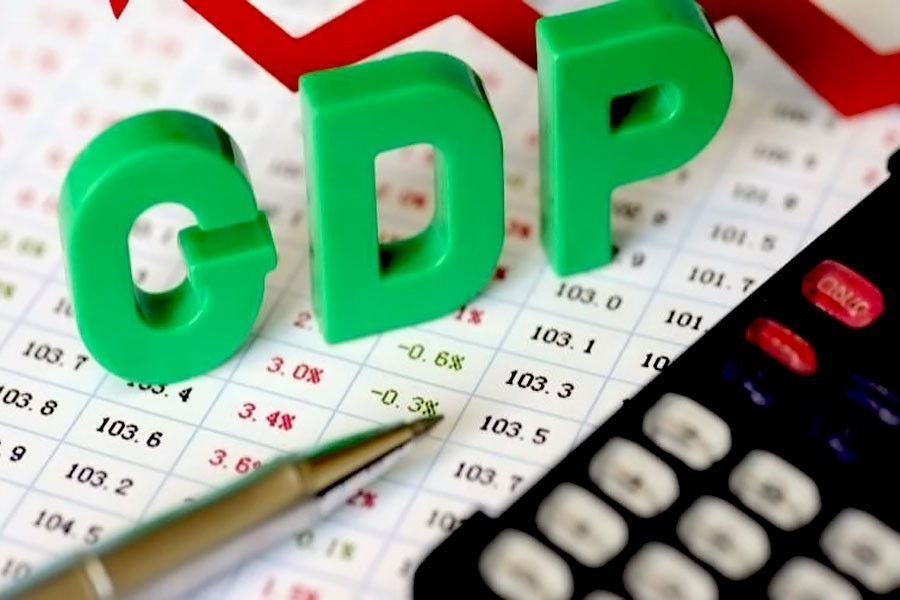A GDP blowup with many leftover economic activities now taken into basket downsizes the ratio of Bangladesh's tax receipts to the gross domestic product, making it region's lowest and hence warranting a raise.
Economists and taxmen say the shrinkage in the country's tax-to-GDP ratio-the ratio of tax revenue to GDP is driven by the rebasing of the national economy.
The macroeconomic indicator is believed lowest among the South Asian nations, coming to 7.7 per cent as of the past 2020-21 fiscal year, being measured by using new GDP elements, according to an official document prepared by the Ministry of Finance.
A new base year has now been chosen by the country's statistical organisation --BBS--to measure all available economic activities of Bangladesh. The base year is now 2015-16 which has taken more economic activities into its basket than in the previous base year of 2005-06.
Frequent changes in base year are a routine work for any statistical agency, such as the Bangladesh Bureau of Statistics, for economic calculations. The size of the economy usually becomes bigger at a time when the GDP is measured under a new base year.
However, this new tax-GDP ratio for the FY 20201 is the lowest as projections made by a number of government agencies were much higher.
Finance Division projected it to be 11.95 per cent at the end of the FY2021 under the old base year, 2005-06. And it should have been at 9.9 per cent under the new base year.
General Economics Division (GED) of the Ministry of Planning in its five-year plan, beginning FY21 [8th five-year plan], projected it to be 9.0 per cent.
Economists familiar with government's fiscal issues were astonished over such development in the key indicator. They say rebasing has no relation with the fall of the indicator.
"Why does the ratio fall? I don't know," quipped Dr Ahsan H. Mansur, an independent voice on the fiscal matters of the government of Bangladesh.
"Actually, I don't find any cause-effect relationship between tax mobilisation and the new GDP value," the economist says.
He thinks a growing and sound economy should have seen increase in both: tax and GDP. "There should not have been significant changes between them (tax and GDP)."
"To my mind, the ratio may nudge up a little bit. But here in Bangladesh the GDP is expanding too fast but tax mobilisation is not following suit," says Dr Mansur, who had worked in a division at the International Monetary Fund (IMF).
He further comments that there are many African nations where the tax-to-GDP ratio is much higher than in Bangladesh.
However, higher tax revenue means that the country can spend more on improving infrastructure, health, education and social safety-net programmes.
The developed nations typically have higher tax-GDP proportions than in the developing countries.
But, according to the World Bank, such an indicator should be at least 15 per cent of the country's GDP.
The WB views this 15-per cent benchmark helps alleviate poverty, create employment and do welfare for the people. But the country never got to this goal.
Again poor tax mobilisation affects government's budget execution. Or government borrowing may be ballooning.
As the country's actual budget execution usually remains much lower than the original, the picture of government's fiscals remain defocused. Dr Zahid Hussain, another independent voice also familiar with the government fiscal matters, told the FE: "To my mind, one of the two figures [tax and GDP statistics] is not true."
Here the numerator is tax and the denominator is GDP. If GDP becomes high, then the ratio will fall, and vice-versa.
"Maybe, the GDP data are wrong or the tax-collection figures are wrong. I don't know which one is correct."
He says Bangladesh is comparing itself with its similar peer countries across the globe and hence "tax status also has to be considered accordingly".
Higher tax collection is deemed imperative to pay for public-welfare programmes and services. If the current situation continues, social security, education, public healthcare and infrastructure development may be affected in future, analysts say.


